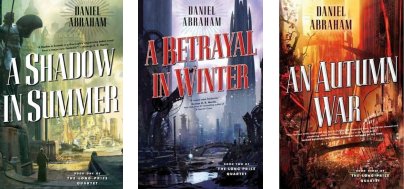Last August I asked for suggestions for different cool fantasy that I ought to be reading, and I’d like to thank everyone who recommended Daniel Abraham to me. Wow, these are good books. And they’re a perfect example of what I wanted—they look like generic fantasy books, they just happen to be brilliant. They are A Shadow in Summer, A Betrayal in Winter, An Autumn War and the forthcoming The Price of Spring.
For those of you who haven’t yet picked them up, I thought I’d point out some things about them that make them different and exciting, with absolutely no spoilers at all.
First, there are four books, and they’re all written. The fourth one won’t be out until July, but I have an ARC right here. It’s written, done, ready to go to press. No interminable waiting.
Also on the “no waiting” front, each of these volumes has unusual amounts of climax and closure. They’re all part of one thing, but each volume has its own story, which is complete in that volume. There’s at least ten years between each book. They’re one evolving story of a people and a world and their problems, and after reading one I definitely wanted the others ASAP, but they don’t end on cliffhangers and they didn’t leave me unsatisfied.
It’s a great world. It borrows things from a lot of different history from around the world, but it doesn’t slavishly imitate any one culture. Also, the magic is totally integrated into the history. It’s more like science fiction in many ways. It’s a consideration of the consequences of having the world work that way. There are poets who can capture “andat” which are the perfect expression of an abstract idea. For instance there’s one called “Stone-made-soft” who can make stone soft and has made some famous mines. The andat are people, are solid, are characters in the books, but they’re also held in the world by the poet’s constant struggle. They have enormous and very specific powers, and they have an agenda, and they keep their cities safe because the threat of them is enough to stop anyone thinking of attacking them. There was an Empire once that had andat and it was destroyed, and what’s left now is a set of cities ruled by Khai. The Khai are allowed to have only three sons (subsequent sons go to train to be poets, few of them make it) and those three sons struggle to kill each other to become Khai. The rest of the world, lacking andat, look on jealously.
There’s no struggle between good and evil. There are good points on both sides. Good people do terrible things for what seem like sensible reasons, and live with the consequences. Good people become awful people. Awful people do good things. People compromise. People change. The issues are really murky and some people are really twisty. Oh, and while we’re talking about people—there are terrific female characters in a world where women have to make more effort to achieve things. There are also very different female characters, and very different male characters too. The characterisation generally is such a strength I almost didn’t mention it. Great characters.
The world keeps expanding as the books go on and actions have consequences, but there’s no retconning. Things that are throwaway mentions in A Shadow in Summer are seen to have great significance later. The plot and worldbuilding and history are solid enough to bite. I hate it when I can’t trust that kind of thing, it’s like leaning on a wall and the house falls over. Here I feel I really can. The technology and the magic and all the details of how the world works make sense and integrate.
This may seem like a strange thing to say, but these are post 9/11 fantasy. I’ve read post 9/11 SF already, but this is the first fantasy that had that feel for me. I don’t mean they have allegory, or even applicability. They’re their own thing, not a shadow-play of our world. But they have that sensibility, in the same way that Tolkien was writing about Dark Lords in the shadow of Hitler and Stalin and Marion Zimmer Bradley was writing about Free Amazons during the seventies upswell of feminism. This may eventually make them seem dated, or very much of this time. But right now is this time, and I found this aspect of them interesting to observe.
They’re rattling good stories of the kind that are easy to sink into and pull over your head. I dreamed about that world every night while I was reading them. If fantasy is Tolkien’s “history, true or feigned” here’s some really solid feigned history of just the sort I like best. I wanted to know what happened. I wanted to keep reading them through meals. I’m sorry to have come to the end of them and I know I’ll be re-reading them before too long. I’ll let you know more about them when that happens, and my considered reflections on them. For the time being, if you like fantasy at all you almost certainly want to read these.
Thank you again for recommending them to me.










